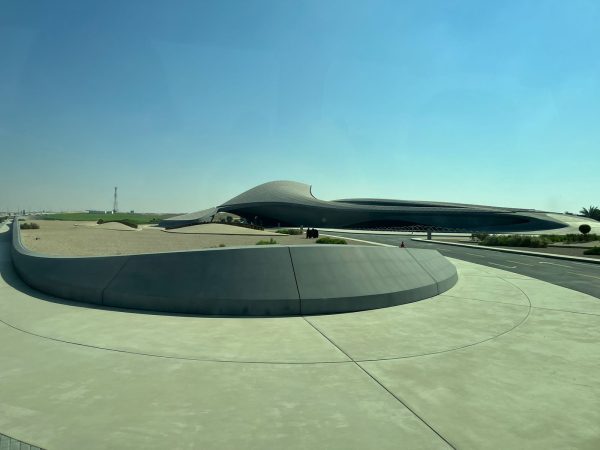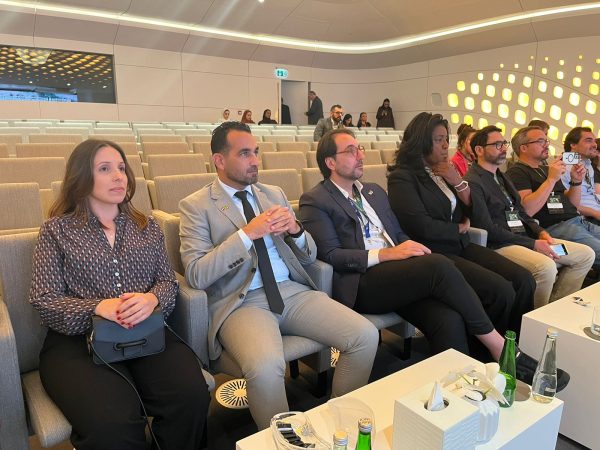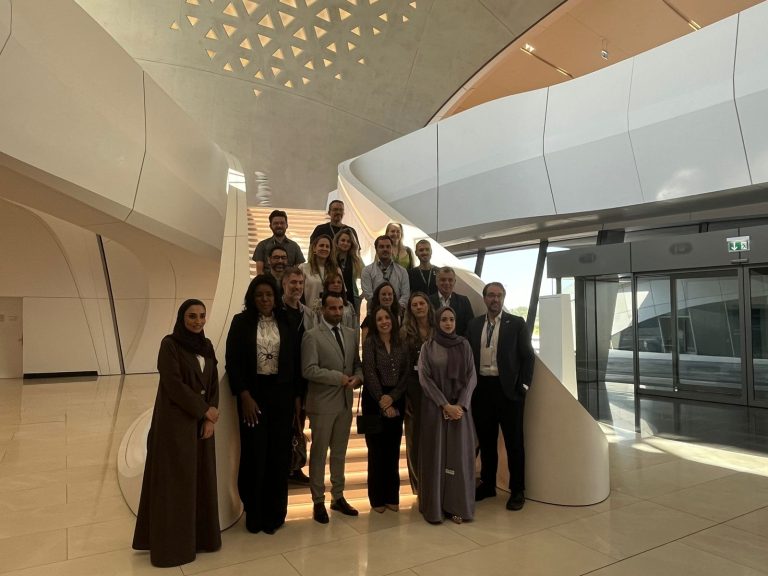Sharjah – “Waste here means business.” So said Global Compact Brazil CEO Carlo Pereira on a visit to the headquarters of Beeah Group in Sharjah, United Arab Emirates, on Tuesday (5) morning. Pereira and a delegation of Brazilian businesspeople visited the building that was the last project designed by Iraqi architect Zaha Hadid, in order to learn the various aspects in which the group acts as an inspiration source for the domestic business community. Beaah Group combines sustainability and technology, particularly in energy and waste management industries. Pictured above, the group visiting the building facilities.
“I believe this is key, as now in Brazil waste is treated like garbage, like something useless, and not only business is lost but problems are created, too, including the thousands of landfills, which are major disease vectors and contaminate the soil and groundwater. This causes a whole lot of trouble, without mentioning the direct or indirect harm on the human health. So there are several reasons why we’re here, besides gazing at this marvelous building,” said Carlo Pereira during the visit.
The visit included a presentation on the areas of activity of the group, which pioneers in sustainable, smart solutions across several industries, with operations in energy, healthcare, education, environmental services, transport, recycling, digital, garbage collection and waste management, and others. Beaah Group was established in 2007 and now has over 13,000 employees working in the UAE, Egypt, and Saudi Arabia.

The project by Zaha Hadid was finished by her office Zaha Hadid Architects and opened last March. The work made up of sustainable materials is 9,000 square meters and is inspired by the UAE desert dunes. The design features a solar roof, which generates 40% of its power. Hadid is considered one of the world’s most talented architects and was know as the “Queen of the Curve” for her swooping designs.
The Global Compact Brazil team and Brazilian businesspeople are in the UAE for the UN climate summit COP28 that is taking place in the country. Pereira said that the Global Compact Brazil will make other visits during the COP28 to a solar farm and a water treatment station, which he believes are important topics for businesspeople in Brazil.
“Our targets are a 2 GW in carbon dioxide equivalent, improving the water efficiency and resilience of companies in Brazil and the circular economy. We want to reach a zero-waste level and greatly improve recycling in Brazil, which is now at 6%. There is a long way to go,” he said.
On the COP28 country host UAE, Pereira said that despite the criticism that it still has a very oil-based economy, the country has invested more and more in technologies for sustainability. “They are making a huge effort. Now 79% of the UAE investments are no longer in oil, so there’s a clear transition. Indeed, the COP28 and [Adnoc] oil company president [Sultan Al Jaber] speaks clearly of transition, which you can see based on data, number, the investments being made,” he said.
Circular Connection
The UN Global Compact Brazil is the world’s largest corporate sustainability action. A new move was recently announced as part of its Ambition 2030 strategy, the Circular Connection, affiliated with the institution’s Environment department, that comes to join other initiatives created to accelerate the targets put forward by the UN Agenda 2030. The moves are a call from the UN Global Compact Brazil for companies to acknowledge the urgent need for holding concrete actions with clearly defined targets and public pledges.
The Circular Connection seeks to ensure responsible production and consumption patterns and intends that companies take over and implement targets that ensure that by 2030 waste is no longer taken to landfills and have at least one circular business model in place. To that end, companies need to set and implement initiatives and projects that create processes in alignment with waste and pollution elimination from the start, as well as maintenance of product and materials and natural system regeneration.

“I see a direct connection [of Beeah Group] with Brazil’s Circular Connection in regard to effluent treatment – which is comparable to our water management move – solar power and efficient buildings, and net zero,” said Pereira. He believes that sustainability and the transition towards a regenerative economy require innovation in technology and processes. “We saw that it’ll demand a large investment but will certainly bring in profit, even if it’s in the long term,” said Pereira.
Fabrício Fonseca, executive director of environmental solution business Ambipar joined the visit. Ambipar is an ambassador of the Circular Connection Move of the Global Compact’s Ambition 2030 strategy. “I’m absolutely sure that investing in research and development is the way in water treatment and management,” said Fonseca after the visit.
“The platform they set up inspired me, as they have a laboratory, environmental consulting, remediation, waste valorization across manufacturing, urban, civil, electronic industries. This environmental solution platform really impressed me, and so did the academy they are setting up, a university to train people. We’ll create a program to train base people in the area, so [it’s good] to know they are applying high-end technology in full scale, that this works. The zero-discharge ambition is near, so that no environmental liability has to exist,” he said.
Of everything that they way in the visit, Fonseca believes what could be implemented in Brazilian companies now is scaling up the waste valorization and circular economy.
The Arab-Brazilian Chamber of Commerce (ABCC) facilitated the visit.
Translated by Guilherme Miranda




